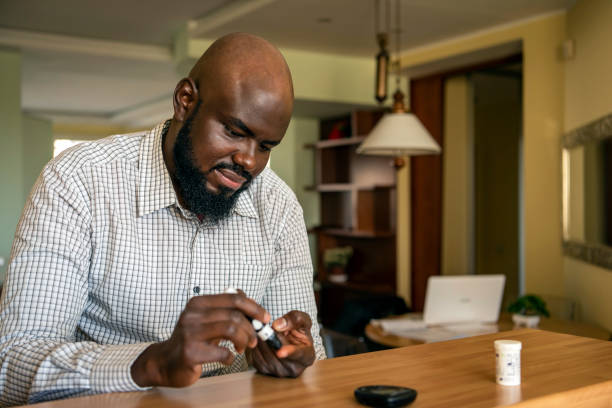(ThyBlackMan.com) Diabetes success is measured by how well you can control your blood sugar. There are 3.2 million Blacks living with diabetes, and one of the major challenges they face is managing their disease with proper diet, regular exercise, and medication.
Many people with diabetes don’t understand that your level of control will determine premiums for health, life, and disability insurance plans. Melissa Thompson of Diabetes365.org explains “Many people inside of the diabetes community are unaware that their level of control of their condition has a direct correlation in their eligibility for insurance products. Gestational diabetes life insurance, and type 1 diabetes life insurance can be obtained if you follow your doctor’s treatment plan, and only if you maintain a well-controlled A1C reading.
However, many factors can affect blood sugar besides diet and activity, and employing some simple steps and strategies in your everyday routine can help not only live a better life, but possibly avoid a trip to the emergency room.
Do a Quick Body Scan
As you dry off from your shower each day, inspect your body head to toe. Look for dry, red, or sore spots that could become infected. Don’t forget the places where moisture can hide and bacteria can grow. Check under your arms and breasts, and between your legs and toes. Pay special attention to your feet. Use a mirror to help you see all over and treat injuries quickly.
Make Insulin Work for Your Lifestyle
If your schedule is fast-paced and meal times are unpredictable, ask your doctor about rapid-acting or fast-acting insulin. It may be a convenient addition to your current therapy. These rapidly acting insulins can be taken just before eating and have an effect on your blood sugars within 30 minutes.

Power Up Your Diet
Print the American Diabetes Association’s list of 10 super foods. They have a low glycemic index, meaning they aren’t likely to cause a spike in blood sugar. They are also packed with important nutrients. Post the list on your refrigerator so it’s at the ready when you make your shopping list, plan meals, or look in the refrigerator for something to eat.
Take a 2-Minute Test
Put your glucose monitor on your nightstand to remind you to check blood sugar first thing in the morning and before bedtime, if your doctor advises. Target range before meals is between 90 and 130 mg/dL. Before bedtime, between 110 and 150 mg/dL.
Put Your Shoes by the Door
Take a minute to put a pair of slip-on shoes and socks near the door so you aren’t tempted to go outside barefoot. Make sure your slippers or house shoes are in a handy location too, so you’ll remember to wear them inside to avoid injury.
Prepare Emergency Snack Packs
Put a few glucose tablets or five or six pieces of hard candy into baggies. Always carry a few with you when you go out in case hypoglycemia — low blood sugar — strikes. It’s hypoglycemia when blood sugar drops below 70 milligrams mg/dL. You may feel, dizzy, hungry, or shaky. Skipping a meal, taking too much diabetes medication, and exercising harder than usual without eating can trigger it.
Put a Tag on Your Gym Bag
Does your doctor recommend you check your glucose levels? Make a reminder for yourself. Checking before and after exercise can help you learn how it affects your levels and it may help you avoid dangerous drops in blood sugar levels.
Drink Some Water
High glucose causes your body to lose fluid, and your skin can get dry. It may get itchy or crack, and that can lead to infection. Drink plenty of water and other fluids to help your skin stay moisturized and healthy.
Remember Your Medical Alert Bracelet
Put your medical alert bracelet or pendant near your watch, rings, or other jewelry you wear every day. This may help you remember to wear it. Or keep it near your toothbrush or keys.
In an emergency where you’re confused or unable to speak, it can save critical time by letting others know about your diabetes.
Exercise in Spurts
Exercising 30 minutes a day is an important part of managing your diabetes. But it can be difficult to fit into a busy lifestyle, so try breaking it up into three 10-minute spurts instead, if need be. Try 10 minutes of strength training in the morning. Play an active game with the family during the day or take a brisk stroll at lunchtime. Then, walk with the dog in the evening.
Diabetes complications can turn minor injury into a major problem. Take a few minutes to gather these supplies:
• hydrogen peroxide for cleaning wounds
• triple-antibiotic cream for dressing cuts and scrapes
• sterile gauze for covering wounds
If you have circulation problems or peripheral neuropathy, you may need to see a doctor or wound care center. Be sure to keep the phone number handy.
Remember that, if you have diabetes, you should talk to your doctor and get their advice about making lifestyle adjustments that are right for you.
Written By Laney Townsend

















Leave a Reply